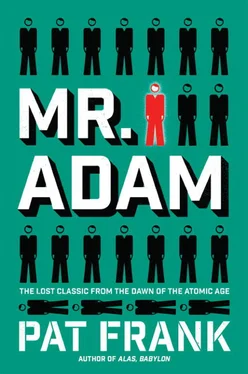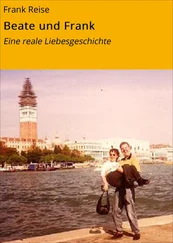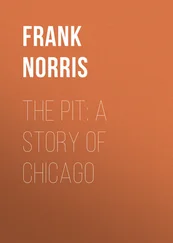Isuppose it is up to me to tell the story in its entirety, because I broke it in the first place, and I lived with it from then on, and I grew to know Mr. Adam. My name is Stephen Decatur Smith, and before I got involved in the most important story in the world I was a feature writer on the New York staff of AP. I specialized in ship launchings, and sports spectacles, and indignation sprees at Town Hall, and the like. I inhabit the ground floor of a brownstone house on West Tenth Street. I am still married, which is a surprise to me.
I got a break on the story strictly by accident, which is of course the way you get most big beats. Most guys who win the Pulitzer Prize are also lucky at shooting craps.
It started on the night I covered the Zionist rally in the Garden. When the last resolution had been unanimously adopted I went hurtling out of the Garden, bound for Toots Shor’s. I never got there, because of my trick knee, and the fat lady. When the fat lady loomed up at the Eighth Avenue entrance I tried some fast evasive action and my trick knee went out on me. If it had not been for that medium tank of a woman the world would not have known for weeks, or perhaps several months, what had happened to it.
I let out a yell, and collapsed against the building, and the fat lady’s mouth flew open, and she put on a burst of speed and got out of there. I knew she thought I was having a fit.
Right across the street from the Garden is Polyclinic Hospital, strategically situated for hockey, rodeo, wrestling, and prize-fight casualties. Some of the very best surgeons in town are on the staff there. They like it, because they never know what will come into the Emergency Room next. As Dr. Thompson says, “It’s like an evac hospital plus a maternity ward.”
It was Thompson I saw after I’d hobbled across the street. He’s a friendly elephant of a man with brown, stubby hands. I’d known him in Italy, during the Gothic Line campaign, when he was running the station hospital outside Florence. I remember watching him with wonder as he worked among the wounded, using those great, powerful hands on the mud-caked doughs as tenderly as a woman touching an infant’s face.
He went to work with those hands on my knee, and in a moment there was one short, sharp pain, and then my knee was good again, as I knew it would be. “It’ll jump out,” he warned, “whenever you try any brokenfield running in traffic.”
“I know,” I said. “Come on down to Shor’s and hoist a couple.”
“Can’t,” Thompson said. “I’ve got a mystery. The board had a meeting today, and they discovered a mystery, and they delegated me to find out why.”
“What’s the mystery?” I asked.
Thompson hesitated a moment. Then he said: “I’ll brief you on it. But it’s not for publication. Not yet. You see, it’s the no reservations in the maternity ward.”
“No reservations. That’s strange.”
“Very. There’s never been less hospital space, compared to the population, than in the last few years, and it has actually been getting worse since the war ended. You see, the increase in the birth rate has been fantastic. You’d think everybody in the United States had settled on one occupation and hobby, and that was producing babies. Why, we’ve been getting reservations for our maternity ward as long as eight months in advance.”
“How can they be sure?” I asked.
“They cannot. But they just speculate. That’s the Broadway crowd for you.” Thompson examined the big loose-leaf ledger on his desk. “Then suddenly,” he said, “nothing at all!”
“You don’t mean,” I suggested, “that people have quit having babies?”
“All I know for certain,” said Thompson, “is that people have quit making reservations to have their babies in Polyclinic Hospital, as of June 22.”
I looked at the ledger. There were twenty names, addresses, telephone numbers, names of attending physicians, and amounts of deposit listed for every day in May, and every day in June, until June 22. Then, as he said, nothing at all.
I said, my finger on June 11: “What do you know, Dotty Fair’s going to be a mamma! Just for fun, I think I’ll scoop Winchell.”
“Now look,” said Thompson, “this is serious.”
“Ridiculous!” I said. “Preposterous! Imagine an institution like Polyclinic spinning in a tizzy because people have decided not to make reservations five months ahead! Hospitals are just money-grubbing, capitalistic corporations, as I’ve always suspected. The truth is that people have just got damned sick and tired of kowtowing to those sacred, omnipotent institutions, the hospitals, and have decided to have their babies at home. And I might remind you that up until about a century ago all babies were born at home.”
Thompson scratched his nose, and said: “Now if a lot of new hospitals had been built, or if we’d had a dysentery epidemic, and a lot of kids had been killed, it would be explainable. But I tell you, Stephen, nowadays they don’t wait until the honeymoon is over to call the hospital.”
I said, soothingly, “I’ll come back tomorrow, and you’ll find it’s been all a mistake, and that some file clerk, fresh out of the WACS, has been bucking all the reservations to the next highest echelon.”
I decided not to go to Shor’s. When you get to Shor’s there are a lot of other newspapermen there and they drink, and talk, and sometimes one of them tells about a story he is going to write for the Sunday section, and then he reads it in another paper on Saturday. I took the Eighth Avenue subway, and walked into our apartment at midnight.
The fire logs were thin, bigger at the ends than in the middle, and in the middle only the blue flame of the dying fire spurted. Marge was on the davenport, asleep, with her long legs crossed and her hands folded across her stomach, and the New York Post shielding her face from the light. The headlines told of fighting in Palestine, China, Burma, and Syria, which is about par for peacetime, but the news didn’t bother me, because Marge was more interesting.
I tiptoed across the room and leaned over to kiss her hair, and she pulled the paper aside and winked at me, and I knew she wasn’t sleeping and kissed her on the mouth instead. I’m the old-fashioned monogamous species of man who loves his wife.
“What’s the matter,” she said, “coming right home like this?”
“A moment without you,” I explained, “is a moment wasted.”
“You’re just feeling lustful,” she said, “or you would be in a pub.” She looked up at me, speculating. It’s amazing, what a woman can find out about a man in four years. “No,” she decided, “it’s not that. You want to tell me about a story.”
“Uh-huh,” I admitted, and I told her about Dr. Thompson and the hospital.
“I think,” she said when I’d finished, “that it’s time we had a baby. The war’s over, the world is settling down, there’s space in the hospitals, and it is time we started building a family. Besides, you’re not getting any younger.”
“I’m only thirty-eight!”
“That’s practically middle-aged. Sometimes I think we should have had a baby right away.”
“Come on,” I said, “what do you think is wrong at Polyclinic?”
“Nothing at all,” Marge said, “except all my friends have been going to Episcopal. I think I’ll go to Episcopal. I want a big room, with a radio, and I’ll want my own nurse for at least the first three days. Weren’t we dopes not to subscribe to group hospitalization?”
Читать дальше













